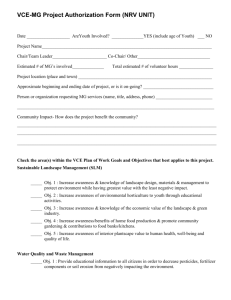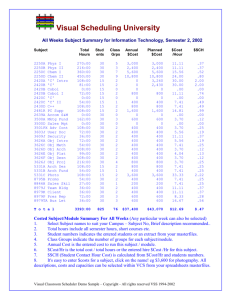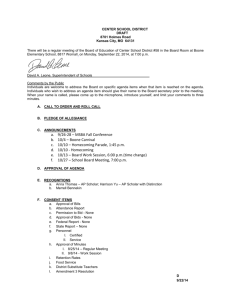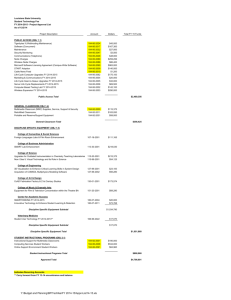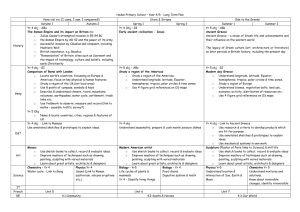Training
advertisement
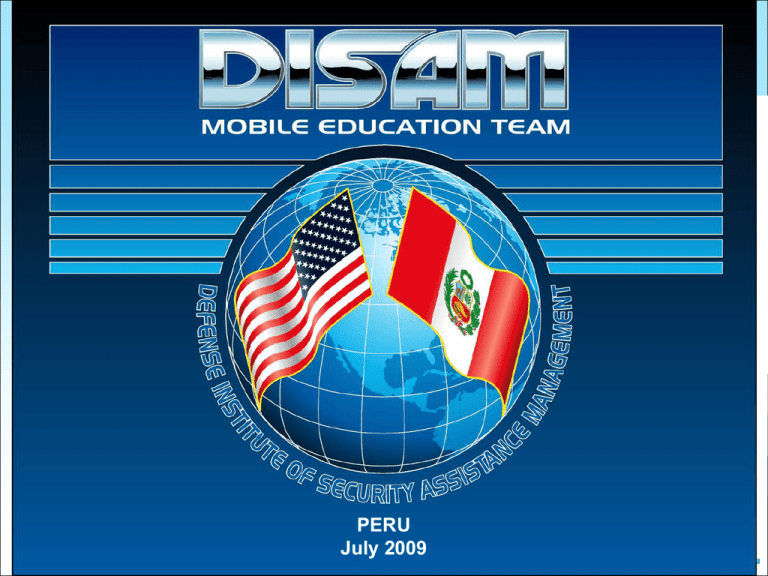
PERU July 2009 02/03/2009 International Training Management 02/03/2009 Learning Objectives 1. Explain why the U.S. conducts international training programs. 2. List implementing laws and regulations. 3. Identify the principal organizations involved in training programs’ policy, management and implementation. 4. Recognize the training programs that Embassy security assistance personnel are responsible for managing. 5. Outline the process used to identify, request, program, and execute U.S. training for international students, including constraints and limitations. 6. Identify the types of training. 7. Explain the financial considerations pertaining to training. 8. Discuss the U.S. Field Studies Program (FSP). 02/03/2009 Why We Train International Students Obj 1 02/03/2009 “Total Package Approach” Training From the end of the runway at Tucson International Airport, an F-16 Fighting Falcon instructor pilot with the Arizona Air National Guard's 162nd Fighter Wing prepares to take off with his wingman, an international student pilot training with the Guard unit. (U.S. Air Force photo/Master Sgt. Dave Neve) HUMMWV Maintenance Training Obj 1 02/03/2009 S.A. Training Definition “Military Education and Training” Para n, Sec 644, Chap. 3, F.A.A. of 1961 as amended “Training” Para (5), Sec 47, Chap. 4, AECA as amended ...includes formal or informal instruction of foreign students in the United States or overseas by officers or employees of the United States, contract technicians, or contractors (including instruction at civilian institutions), or by correspondence courses, technical, educational, or information publications & media of all kinds, training aids, orientation, (training exercise) & military advice to foreign military units & forces,... Obj 2 02/03/2009 Policy and Procedures Security Assistance Management Manual (SAMM), Chapter 10 Joint Security Assistance Training (JSAT) Regulation Rewrite – Joint Security Cooperation Education and Training (JSCET) Regulation Obj 2 02/03/2009 Int’l Training Management Web Site http://www.disam.dsca.mil/itm References Policy Memos Messages Training Programs Automation State Dept MILDEP/MILSVC COCOM DLIELC SCO IMSO IMS Functional Areas New Items Obj 2 02/03/2009 Overview Background Training Organizations Training Program Components Training Process Types of Training Financial Considerations U.S. Field Studies Program Training Automation 02/03/2009 Training Organizations Congress President Dept of State Dept of Defense SecState SecDef Ambassador COCOM DSCA SCO DISAM Host Nation Dept of Army Dept of AF Dept of Navy DASA DE&C SAF/IA Navy IPO SATFA AFSAT NETSAFA SCETC CG-DCO-I SATMO IMSO ITD IMSO/ Teams Teams DLIELC IMSO/ Teams IMSO/ Teams IMSO Teams Obj 3 02/03/2009 Overview Background Training Organizations Training Program Components Training Process Types of Training Financial Considerations U.S. Field Studies Program Training Automation 02/03/2009 S.A. Training Personnel manage… Security Assistance International Military Education & Training “IMET” (code I or X) FY09: 400K (354K programmed ) FY10: 749K Foreign Military Sales “FMS” (code F) SJC999 (C-130 simulator) (1987) TBH001 (SH-3 Simulator) (1999) TBN999 (Intl log/sup mgmt) (2006) no current training cases Foreign Military Financing Program “FMFP” FY09: 750K FY10: 3,000K no current training cases Training Exchanges (code E) FY07: 07E001 (Naval Command College) FAA, Sec 506(a)(1) or (2) grant drawdowns none Obj 4 02/03/2009 S.A. Training Personnel manage… Security Cooperation Combating Terrorism Fellowship Program “CTFP” (code B) FY09: 516K FY10: 103K International Narcotics Control & Law Enforcement “INCLE” (code S) FY09: 37,000K (138K prg) FY10: 40,000K Section 1004 Counter Drug (code D) FY09: 1,835K prg FY10: 1,977K Aviation Leadership Program “ALP” (code A) FY07: 44K FY08: 23K Obj 4 02/03/2009 IMET Objectives Regional stability through training which increases understanding and defense cooperation between the U.S. and host nation Increased ability of host nation personnel to absorb and maintain basic democratic values and protect internationally recognized human rights Obj 4 02/03/2009 Expanded IMET Not separate program - part of IMET Courses with following objectives Defense resource management Civilian control of military Internationally recognized human rights Improved military justice systems Courses approved by DSCA Obj 4 02/03/2009 IMET Policy Considerations (Requires waiver) Training… ...teams (deployment of US personnel) …providing a postgraduate degree except at Navy PGS and Air Force AFIT …of duration less than 5 weeks …of cost greater than $50K …provided by contractors …of civilians (other that E-IMET) Orientation tours Obj 4 02/03/2009 IMET Policy Considerations (Cannot be waived) Training… …not related to IMET program objectives …of non-career military personnel …of skills available in-country (not PME) …already provided in sufficient quantity …where skills will not be properly utilized …at US civilian schools Repetitive training in the same course Initial training in support of FMS materiel Obj 4 02/03/2009 IMET Policy Considerations (Cannot be waived) Sniper Training English language training not in support of specific training Foreign language training Training aids other than English language materials Correspondence/distance learning courses Doctoral/PHD courses National Intelligence Program training Obj 4 02/03/2009 Combating Terrorism Fellowship Program (CTFP) Approx. $35M per fiscal year Specific Combating Terrorism training courses, PME, other, etc. Program Manager is Assistant Secretary of Defense for Global Security Affairs (ASD/GSA) Course AND student have to be approved by ASD/GSA Obj 4 02/03/2009 Identifying Training Cases Line on Defined Order Case Blanket Order Case Naming conventions for other programs look like case designators 07I - fiscal year 2007 IMET 08B - fiscal year 2008 CTFP 09D - 1004 counter drug Obj 4 02/03/2009 Overview Background Training Organizations Training Program Components Training Process Types of Training Financial Considerations U.S. Field Studies Program Training Automation 02/03/2009 Identify Training Needs WHEN WHAT KIND WHERE COST HOW MANY = Chef D,Entrainment Militaire Training Needs Non-U.S. Sources Direct Commercial Sources FMS, IMET, Other Obj 5 02/03/2009 Country Training Requirement “WE NEED TO TRAIN A.....” Chief D,Entrainment Militaire Training Officer SCO Bandaria Obj 5 02/03/2009 Refine Training Requirement Internet & TMS Obj 5 02/03/2009 SCO Training Request E-mail Request To: From: Subject: Army CPM SCO Request for Training Request the following training be added to Bandaria’s training program: BN-D-YCY-989 B121260 (Infantry BOLC), 3rd qtr, FY09 B121260 (Infantry BOLC), 3rd qtr, FY09 B121260 (Infantry BOLC), 3rd qtr, FY09 SCO MOD MILSVC S.A. Training Agency B121255 (Finance BOLC), 4th qtr, FY09 B121255 (Finance BOLC), 4th qtr, FY09 Thank you, SCO BANDARIA FMS IMET CTFP Etc. Obj 5 02/03/2009 MILDEP Training “Program” STLs ARMY NAVY Air Force SCO MOD SATFA, AFSAT, NETSAFA, SCETC, CG-DCO-I MSG Authorize Training Implementation BANDARIA Obj 5 02/03/2009 Standardized Training List (STL) Obj 5 02/03/2009 Student Input MILSVC Training Agency Arrival Message SCO MOD Military Service School Student BANDARIA BANDARIA Input IMS Obj 5 “Report to: your IMSO” Captain John Doe Building No. 234 Telephone No. 432-254-4449 02/03/2009 Int’l Military Student Office Command Supt International Military Students and Dependents Sponsors US FSP Base Facilities SAMM JSAT IMSO Arrival Message Service Regs Bio Data IMSO Handbook Invitational Travel Order Obj 5 02/03/2009 Combatant Command’s Security Cooperation Education and Training Working Group (SCETWG) Who? Country A Country B SCO Training Officers Country C MILSVC Training Agencies + State Defense DSCA Schools DISAM Component Commands Mar-May each year 5-8 days PACOM - Mar CENTCOM - Apr When? EUCOM - Apr AFRICOM - May NORTHCOM/SOUTHCOM - May PACOM - Asia CENTCOM - Tampa Bay, FL Where? EUCOM - Garmisch, GE AFRICOM - Garmisch, GE NORTHCOM/SOUTHCOM - Miami, FL - Review and coordinate CETPP - Briefings on training policy issues, What programs, and planning issues And - Finalize budget year training Why? program - Review out year training program - Provide specialized instruction for SCOs, as needed Obj 5 02/03/2009 Overview Background Training Organizations Training Program Components Training Process Types of Training Financial Considerations U.S. Field Studies Program Training Automation 02/03/2009 Types of Training English Language Resident (DLIELC) Non-resident (in-country) Specialized English training Formal Training Professional military education Technical training Flying training Specialized Training On-the-job training Observer training Orientation training groups Exported Training Obj 6 02/03/2009 English Language Training http://www.dlielc.org Necessity/criticality English Comprehension Level (ECL) test Oral Proficiency Interview (OPI) DLIELC provides General English training (GET) Specialized English Training (SET) ECL/SET/OPI prerequisite identified in training MASL 70 SA, 70 SR, 2/2 In-country vs DLIELC training Obj 6 02/03/2009 English Language Training May want to review ECLs for your courses Country is (not) exempted from ECL testing, IMS candidates must be tested in country by SCO and again once they arrive at the first training location Obj 6 02/03/2009 Training Locations Continental U.S. In-country Short term Mobile Training Team (MTT) Mobile Education Team (MET) Long Term - Field Training Services (FTS) DoD Extended Training Services Specialist (ETSS) Contract Field Services (CFS) personnel Combatant Command region/third country Obj 6 02/03/2009 Overview Background Training Organizations Training Program Components Training Process Types of Training Financial Considerations U.S. Field Studies Program Training Automation 02/03/2009 Security Assistance Training (DoD 7000.14-R, Vol. 15) Pricing Procedure Tuition prices computed annually Training MASL published by MILDEP In effect for full year (w/adjustments) Multi-tier pricing structure Obj 7 02/03/2009 Training Price Structure FMS - Incremental IMET/Grant Obj 7 02/03/2009 Total Cost of Training - FMS Included in the LOA Tuition price Administrative surcharge Medical services* Costs to country Transportation Pay and allowances Other * FMS case, country, or IMS may be billed Obj 7 02/03/2009 Total Cost of Training - IMET IMET pays Tuition price Travel Living allowance Medical services Under cost sharing, country may pay Travel (overseas/CONUS) Living allowance Obj 7 02/03/2009 Cancellation Charge 50% of tuition cost If received <60 days prior to start date 100% of tuition cost Contract training 5th quarter training - received after 30 Sept Dedicated International training Attrition - proportional, no less than 50% Obj 7 02/03/2009 Overview Background Training Organizations Training Program Components Training Process Types of Training Financial Considerations U.S. Field Studies Program Training Automation 02/03/2009 U.S. Field Studies Program (DoDD 5410.17)/FSP Opportunity to obtain balanced understanding of U.S. Society Institutions Ideals U.S. commitment to basic principles of internationally recognized human rights Perspective on American life to complement and enhance military aspects of training Develop personal friendships in military and civilian community Obj 8 02/03/2009 Goal of the FSP “To ensure that international students return to their homelands with an understanding of the responsibilities of governments, militaries, and citizens to protect, preserve, and respect the rights of every individual.” Obj 8 02/03/2009 FSP Facet Areas Human Rights Law of War International Peace & Security U.S. Government Institutions Political Processes Judicial System Free Market System Media Education Health and Human Services Diversity and American Life Obj 8 02/03/2009 Overview Background Training Organizations Training Program Components Training Process Types of Training Financial Considerations U.S. Field Studies Program Training Automation 02/03/2009 Automation SATFA, NETSAFA, AFSAT SCETC, CG-DCO-I Black Box DSAMS TM ITO Repository * STL/T-MASL Data, IMS Info ISAN Country Internet ISANweb SAN SCO-Tweb Internet SCO IMSOweb Internet * STL Updates: Army, Maritime – daily Air Force – 3 times per week IMSO TMS 02/03/2009 International Training Management 02/03/2009
